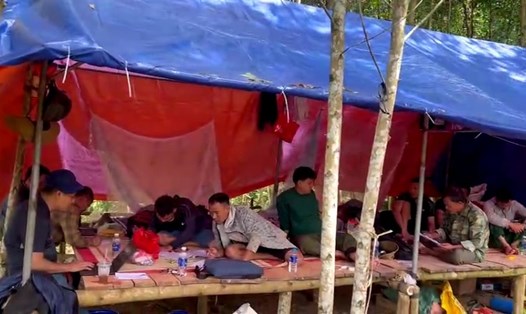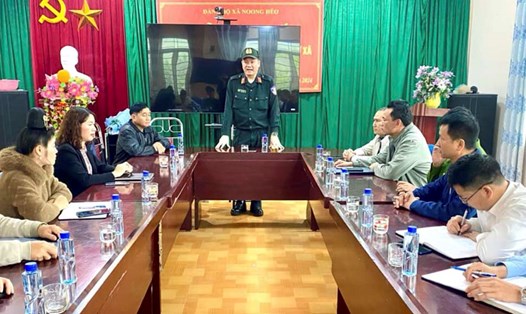Submerging at the bottom of the river, keeping the life of a child
In the early days of the dry season, the receding water caused the Dak Mi riverbed through Phuoc Chanh commune (Da Nang city) to have no bottom. Under the layer of sand and gravel, groups of Je Trieng people are struggling to treat each other as a test of fate. Without modern equipment, without labor protection, each person only has a plastic basket, an old velvet mat and a fragile hope for a few golden grains.
The image of Mr. Ho Van H. (50 years old) lom in the middle of the stream, next to his 6-year-old son sitting on the dry sand, makes anyone who sees it feel sad. "The child is still young, no one is looking after him, he has to take him. The older children are in the fields. If I don't work, I won't have the money to take my child to the doctor," said Mr. H., his voice was voiceless because of the wind and heat and fatigue.
Not far away, the young man Ho Van D. (21 years old) helps his mother with golden provisions and takes the opportunity to spread the net in the afternoon. Holding the cold rice in his hand, D. just calmly said: The house is 10 kilometers away, but I go every day. I have a lot of back pain... but I don't know what to do".
The work of "gold rewarding the camel" looks simple but extremely arduous. According to Mr. Ho Van D., a senior, every day the couple has to filter dozens of baskets of sand and gravel. After washing through a carpet lining, if any, the smooth gold will settle down and be collected for another serving to separate. "If I win, I get 300,000 VND a day, many days it is not enough to buy rice," said Mr. D.
Although they know it is illegal, many people still ignore it. "The government has mobilized many times, but it is so poor that if we don't go, we won't know how to live", said Ms. Ho Thi N. - a woman with a seriously ill child. The money earned from the bottom of the river is not only a livelihood but also a life for the sick at home, for tonight's meal, for tomorrow, we don't know what will happen.
But hidden behind that golden layer of sand are potential risks. The use of mercury and cyanide in the gold parting process, whether small or large, directly threatens the health of people and the ecosystem of Dak Mi River. In addition, being treated goldenly near the foot of the hydroelectric dam, when the water suddenly releases, can become a disaster at any time.

Farms, machinery and deep gold mines
If in the riverbed, people make a living quietly, then in forests like Thanh Binh or Que Phuoc, an "underground market" is operating on a large scale and is well organized.
We entered the gold fields of Ho Nuoc and Ho Do (Thanh Binh commune) on a day in late June. In the middle of the acacia plantation, the green tarpaulin camp grew in abundance. Excavators, generators, and ore soaking tanks of tens of square meters are operating non-stop. The sound of the explosive mixed with the noise of people hurriedly like a large construction site in the middle of the deep forest.
Under the deep mines, workers remove soil and rocks onto the ground through a net, then soak them in chemicals such as soda, lime, and cyanide to separate the gold. Wastewater then flows freely into the ground, seeping into the underground water system - an immeasurable ecological hazard.
Not far away, in Que Phuoc commune, dozens of people are also digging tunnels through theai dau rung - a place that was heavily searched in 2019. This time, they organized more methodically: Assign guards, scouts. When the authorities discovered the machinery, they immediately hid it, and the workers took to the forest to hide. Each person is hired for 400,000 a day. Just be proactive, then withdraw immediately, a worker confided.
Recently, Que Phuoc Commune Police launched a search and searches in the Xai Chuc - Xai Hung area (Mau Long village).
Ms. Tao Thi To Diem - Chairman of Que Phuoc Commune People's Committee - said: "We determined that this was a serious act of encroachment on resources. Recently, taking advantage of the locality's arrangement of administrative units, the subjects have been secretly operating again. The government is determined not to let it happen again.






